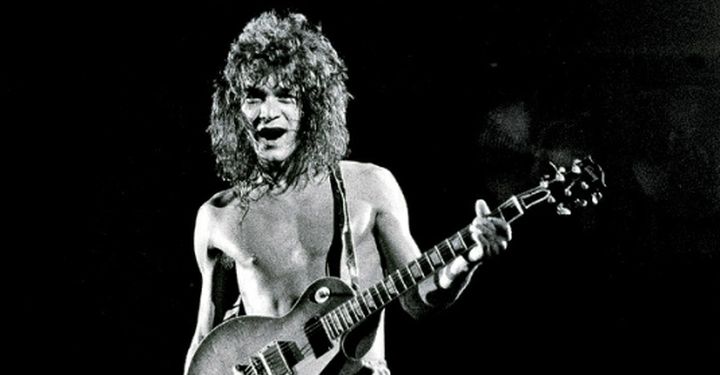
Credit: Neil Zlozower
While Eddie Van Halen became the master of two-handed tapping, he often reminded the rock media that he wasn’t the first to come up with the technique. One guitarist he’d often name-check was Steve Hackett, something Hackett is still grateful for.
Below is an excerpt from Hackett’s interview with Ultimate-Guitar’s Greg Prato:
Do you feel like you are finally getting the credit and recognition for being one of the first two-hand tappers?
“It seems like that’s the case. Eddie Van Halen gave me some name-checks with this, and he says that’s where he got it from – I’m very grateful for him saying that. Obviously, Eddie was a great guitarist. I was also mindful of the fact that Jeff Beck had just passed when I was doing many of these guitar overdubs – particularly with the opening tune [from my new album The Circus and the Nightwhale called ‘People of the Smoke’].”
“As happens oh so often. It’s a little bit like when you’re a singer, and you try to do an impression of Louis Armstrong or somebody – when you’re playing a guitar, it’s a little bit like, ‘Who are you going to be?’ If you do fast tapping, people are going to go, ‘Yeah, that’s him.’ If you get an upper harmonic screaming away, it will be, ‘Yeah, that’s Brian May.’ Whatever Les Paul brings to it, or if I’m playing nylon guitar and recording some pieces that have been influenced by Segovia or actual pieces that he recorded, to some extent you are functioning like a character actor.”
“I was probably uttermost in mind — ever since I was 16 in 1966, I was listening to Jeff Beck and hanging on to his every note. And with the passing of that genius of the guitar – and working with a tremolo arm – I was saying to myself from time to time, ‘I wonder if this was something he might have done?’ And this thing happens quite a lot – ‘Is he influencing me?’ Yes.’ How that influence works, I don’t know. There will always be an influence. It was the first time I heard distortion and echo and reverb all those years ago. The first time I was hearing guitar sustaining sounding like a voice. So, those things don’t go away – when they get you when you’re young, they kind of got you for life. So, there will always be a ghost of Jeff Beck in what I do. And I think the other people I mentioned, too. I’d like to think there’s something that I do that others don’t.”
“But the glossary of terms, it has to be shared with everybody. If you introduced something that Eddie names as tapping, and then that becomes part of the language for shredders… If you’re tapping, you can be the fastest gun in the west for five seconds. It’s not all about technique. I think simplicity and melody – for the right line, the right rhythm, the right moment. All of those imponderables that we don’t know where it comes from – it just feels right. We have to go with instinct at the end of the day. All of us guitarists.”
“But it’s still a fascinating instrument. I would just hear someone with an extraordinary tone at some point, and I think that’s what drives me more than anything else – the sound of the instrument. And then when you get that sound that is really exciting, I can go anywhere with this. I say to myself, ‘I can go anywhere with this. This is great. There are no dead spots here on the instrument. I’m away.’ It’s a bit like the racing car somehow – once you’re in the driver’s seat, you face the track and you can go anywhere you want. So, be as bold as you like or restrained as you like. But be influenced by everybody – let everybody be your teacher. But don’t have any gurus, I would say – don’t let anyone tell you you’re doing it wrong. I think that’s the beauty of having been self-taught is — nobody ever ‘failed’ me. Only myself. Self-improvement? Fine.”